#European Jews
Text

Fragment of Ghetto wall, Sienna street, Warsaw, Poland

"In the period from Nov 15, 1940 to Nov 30, 1941 this wall marked the limit of The Ghetto"

"A brick from this place is in the Yad Vashem Museum in Jerusalem"
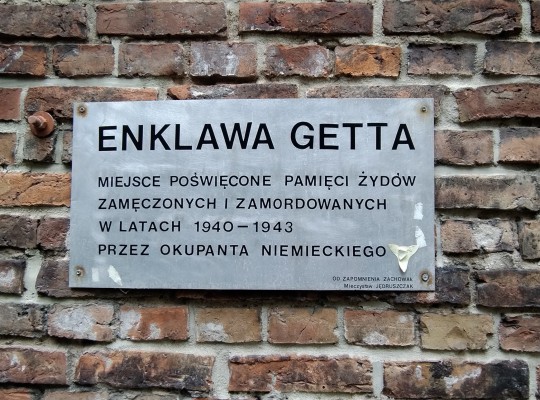
Ghetto Enlave
"A place dedicated to the memory of Jews tortured and murdered in 1940-1943 by the German occupant"
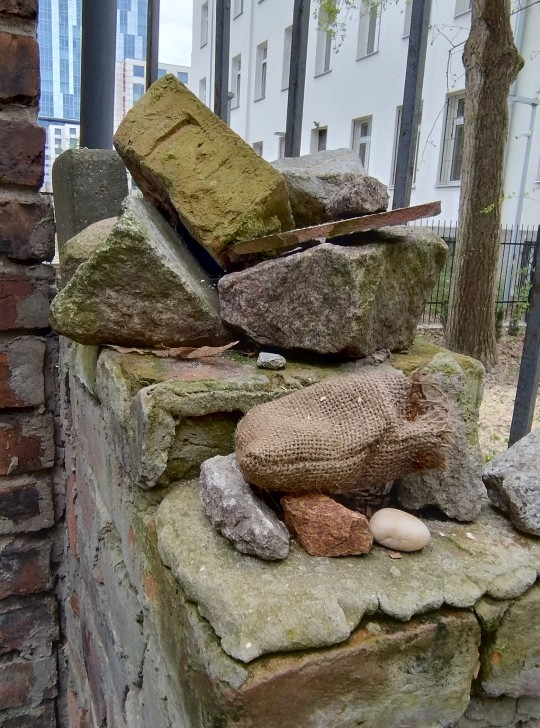
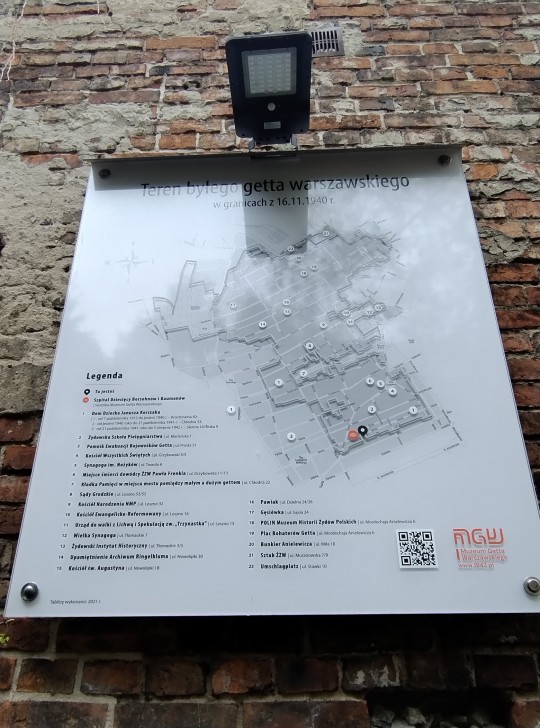
#yiddish#jidysz#jewish culture#jews in poland#jewish history#ww2#world war 2#Warsaw#warsaw ghetto#jewish ghetto#warszawa#warszawskie getto#holocaust#shoah#never again#jewish genocide#am yisrael chai#poland#german occupation#poland world war 2#holocaust remembrance#holocaust remembrance day#ashkenazi jews#ashkenazi#european jews#polish jews#judaica#ghetto#ghetto wall#ghetto in warsaw
15 notes
·
View notes
Text
I hear so much talk in the mainstream Christian and Muslim statements and some Jewish discussions about Jews not accepting that we were often Christianised. This is blown out of proportion because there was a lot of history to that development. What did one do to survive, and how vain it seems when faced with war? But you'll still be a Jew at heart, and you are connected by family ties to non-Christianised Jews forever. No matter what you believe, you cannot ignore the love one has for one's own people and heritage. This does not mean one has to agree on everything; love and loyalty should be there. This goes for the maternal line and paternal lines, especially in Germany, where my Jewish family had been residing for almost two thousand years before either getting killed or scattered around the globe. Christians have often reached out to us and helped, yet they have also, most of the time, misunderstood us, treated us as outsiders and belittled our understanding of God. I can understand why many Jews now do not want to reach out to me, thinking I have forgotten the past and that I would enjoy my "goy" life.On the contrary, I do not enjoy the situation I am in. But I have to live with what Hashem gave me gracefully. I believe if Jesus Christ knew my problem, he would be compassionate about my wish to reconnect with my family and my diaspora and believe in the idea of a Jewish homeland. I will remember his teachings, too.
7 notes
·
View notes
Text

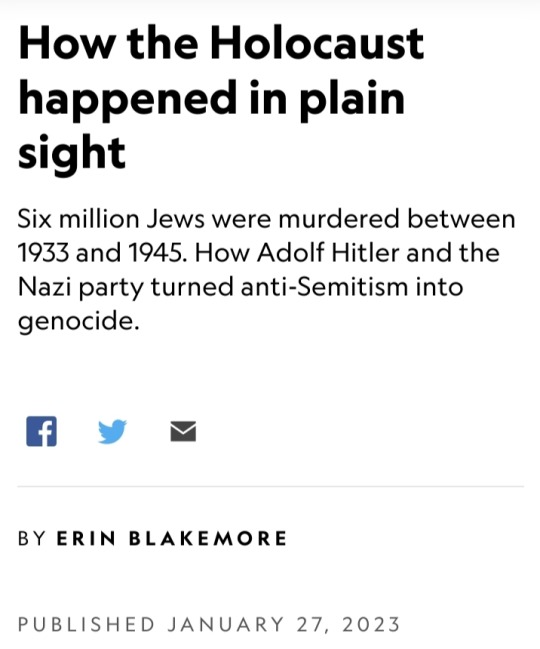
Six million Jews murdered. Millions more stripped of their livelihoods, their communities, their families, even their names.
The horrors of the Holocaust are often expressed in numbers that convey the magnitude of Nazi Germany’s attempt to annihilate Europe’s Jews.
The Nazis and their collaborators killed millions of people whom they perceived as inferior—including Jehovah’s Witnesses, gay men, people with disabilities, Slavic and Roma people, and Communists.
However, historians use the term “Holocaust”—also called the Shoah, or “disaster” in Hebrew—to apply strictly to European Jews murdered by the Nazis between 1933 and 1945.
No single statistic can capture the true terror of the systematic killing of a group of human beings—and given its enormity and brutality, the Holocaust is difficult to understand.
How did a democratically elected politician incite an entire nation to genocide? Why did people allow it to happen in plain sight? And why do some still deny it ever happened?
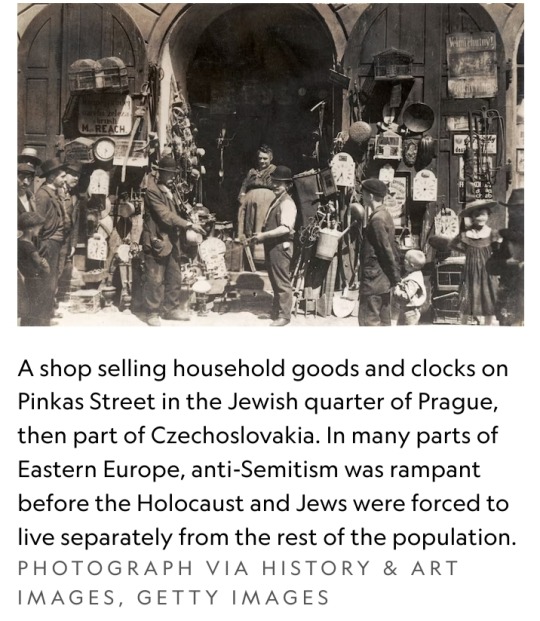

European Jews before the Holocaust
By 1933, about nine million Jews lived across the continent and in every European nation.
Some countries guaranteed Jews equality under the law, which enabled them to become part of the dominant culture.
Others, especially in Eastern Europe, kept Jewish life strictly separate.
Jewish life was flourishing, yet Europe’s Jews also faced a long legacy of discrimination and scapegoating.
Pogroms—violent riots in which Christians terrorized Jews—were common throughout Eastern Europe.
Christians blamed Jews for the death of Jesus, fomented myths of a shadowy cabal that controlled world finances and politics, and claimed Jews brought disease and crime to their communities.
The rise of Adolf Hitler
It would take one man, Adolf Hitler, to turn centuries of casual anti-Semitism into genocide.
Hitler rose to power as leader of the National Socialist German Workers’ Party, also known as the Nazi Party, in the 1920s.
Hitler harnessed a tide of discontent and unrest in Germany, which was slowly rebuilding after losing the First World War.
The nation had collapsed politically and economically, and owed heavy sanctions under the Treaty of Versailles.
The Nazi party blamed Jews for Germany’s troubles and promised to restore the nation to its former glory.
Hitler was democratically elected to the German parliament in 1933, where he was soon appointed as chancellor, the nation’s second-highest position.
Less than a year later, Germany’s president died, and Hitler seized absolute control of the country.
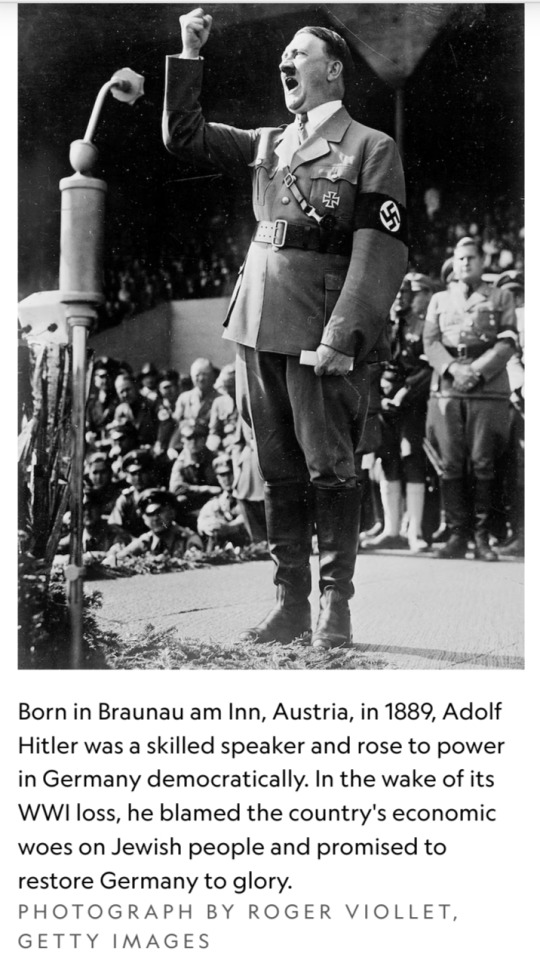
The early Nazi regime
Immediately after coming to power, the Nazis promulgated a variety of laws aimed at excluding Jews from German life—defining Judaism in racial rather than religious terms.
Beginning with an act barring Jews from civil service, they culminated in laws forbidding Jews from German citizenship and intermarriage with non-Jews.
These were not just domestic affairs: Hitler wanted to expand his regime and, in 1939, Germany invaded Poland.
It marked the beginning of the Second World War—and the expansion of the Nazis’ anti-Jewish policies.
German officials swiftly forced hundreds of thousands of Polish Jews into crowded ghettoes, and with the help of locals and the German military, specially trained forces called the Einsatzgruppen began systematically shooting Jews and other people the regime deemed undesirable.
In just nine months, these mobile murder units shot more than half a million people in a “Holocaust by bullets” that would continue throughout the war.
But Hitler and his Nazi officials were not content with discriminatory laws or mass shootings.
By 1942, they agreed to pursue a “final solution” to the existence of European Jews:
They would send the continent’s remaining 11 million Jews east to death camps where they would be forced into labor and ultimately killed.
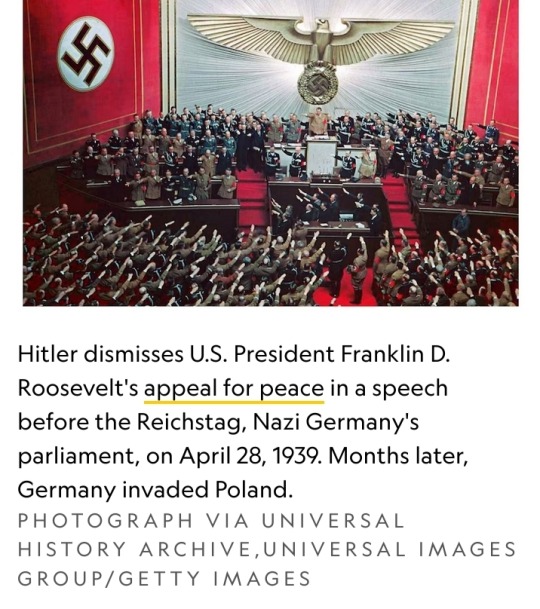
Genocide in plain sight
By characterizing their actions as the “evacuation” of Jews from territories that rightfully belonged to non-Jewish Germans, the Nazi operation took place in plain sight.
Though thousands of non-Jews rescued, hid, or otherwise helped those targeted by the Holocaust, many others stood by indifferently or collaborated with the Nazis.
With the help of local officials and sympathetic civilians, the Nazis rounded up Jews, stripped them of their personal possessions, and imprisoned them in more than 44,000 concentration camps and other incarceration sites across Europe.
Non-Jews were encouraged to betray their Jewish neighbors and move into the homes and businesses they left behind.

Dachau, which opened near Munich in 1933, was the first concentration camp.
Five others—Auschwitz-Birkenau, Chelmno, Belzec, Sobibor, and Treblinka—were designated as killing centers, where most Jews were immediately murdered upon arrival.
The killings took place in assembly-line fashion:
Mass transports of Jews were unloaded from train cars and “selected” into groups based on sex, age, and perceived fitness.
Those selected for murder were taken to holding areas where they were told to set aside their possessions and undress for “disinfection” or showers.
In reality, they were herded into specially designed killing chambers into which officials pumped lethal carbon monoxide gas or a hydrogen cyanide pesticide called Zyklon B that poisoned its victims within minutes.

Credit: Zyklon B (Wikipedia)
The earliest Holocaust victims were buried in mass graves. Later, in a bid to keep the killings a secret, corpses were burned in large crematoria.
Some Jews were forced to participate in the killings, and then were themselves executed to maintain secrecy.
The victims’ clothing, tooth fillings, possessions, and even hair was stolen by the Nazis.
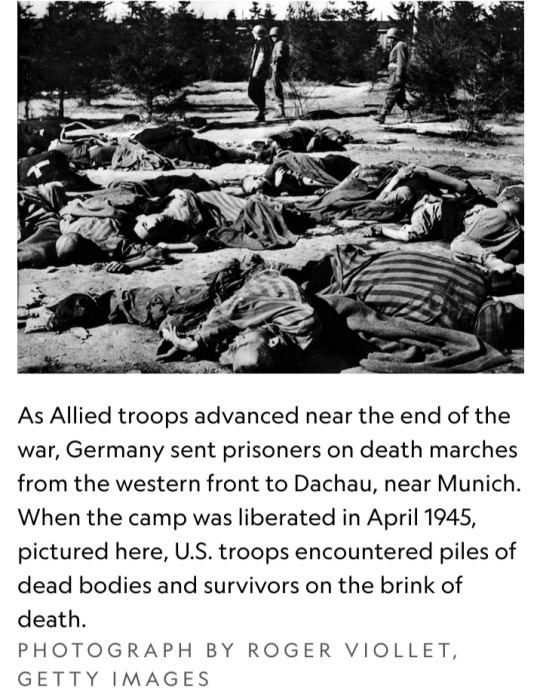
Life in the camps
Those not chosen for death were ritually humiliated and forced to live in squalid conditions.
Many were tattooed with identification numbers and shorn of their hair.
Starvation, overcrowding, overwork, and a lack of sanitation led to rampant disease and mass death in these facilities.
Torture tactics and brutal medical experiments made the camps a horror beyond description.
“It is not possible to sink lower than this; no human condition is more miserable than this, nor could it conceivably be so,” wrote Auschwitz survivor Primo Levi in his 1947 memoir.
“Nothing belongs to us any more…if we speak, they will not listen to us, and if they listen, they will not understand. They will even take away our name.”
But despite almost inconceivable hardships, some managed to resist.
“Our aim was to defy Hitler, to do everything we [could] to live,” recalled Majdanek and Auschwitz survivor Helen K. in a 1985 oral history. “He [wanted] us to die, and we didn’t want to oblige him.”
Jews resisted the Holocaust in a variety of ways, from going into hiding to sabotaging camp operations or participating in armed uprisings in ghettoes and concentration camps.
Other forms of resistance were quieter, like stealing food, conducting forbidden religious services, or simply attempting to maintain a sense of dignity.
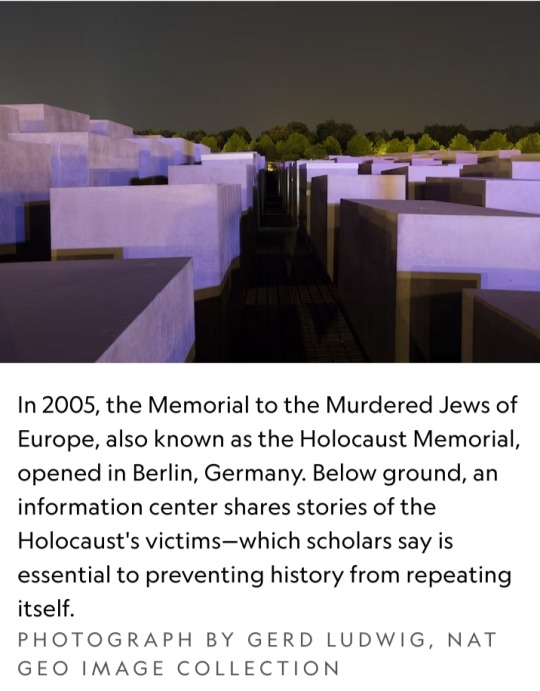
The aftermath of the Holocaust
As World War II drew to a close in 1944 and 1945, the Nazis attempted to cover up their crimes, burning documents, dismantling death camp sites, and forcing their remaining prisoners on brutal death marches to escape the advancing Allies.
They didn’t succeed: As they liberated swaths of Europe, Allied troops entered camps piled high with corpses and filled, in some cases, with starving, sick victims.
The evidence collected in these camps would become the basis of the Nuremberg Trials, the first-ever international war crimes tribunal.
In the war’s aftermath, the toll of the Holocaust slowly became clear.
Just one out of every three European Jews survived, and though estimates vary, historians believe at least six million Jews were murdered.
Among them were an estimated 1.3 million massacred by the Einsatzgruppen; approximately a million were murdered at Auschwitz-Birkenau alone.
Many survivors had nowhere to go. Poland had Europe’s largest Jewish population before the war but lost 93 percent of that population in just five years.
Entire villages and communities were wiped out and families scattered across Europe.
Labeled “displaced persons,” survivors attempted to rebuild their lives. Many left Europe for good, emigrating to Israel, the United States, or elsewhere.
Holocaust denial
Despite the enormity of evidence, some people sowed misinformation about the Holocaust, while others denied it happened at all.
Holocaust denial persists to this day, even though it is considered a form of antisemitism and is banned in a variety of countries.
How to counter the hate? "Educating about the history of the genocide of the Jewish people and other Nazi crimes offers a robust defence against denial and distortion," concluded the authors of a 2021 United Nations report on Holocaust denial.
Though the number of Holocaust survivors has dwindled, their testimonies offer crucial evidence of the Holocaust’s horrors.
“The voices of the victims—their lack of understanding, their despair, their powerful eloquence or their helpless clumsiness—these can shake our well-protected representation of events,” said Saul Friedländer, a historian who survived the Holocaust and whose parents were murdered at Auschwitz, in a 2007 interview with Dissent Magazine.
“They can stop us in our tracks. They can restore our initial sense of disbelief, before knowledge rushes in to smother it.”
#Holocaust#Nazi#European Jews#Jews#Shoah#World War II#concentration camps#genocide#Germany#Poland#Europe#Allied Forces#Nazi Party#National Socialist German Workers’ Party#Austria#Holocaust Memorial#Memorial to the Murdered Jews of Europe#Nuremberg Trials#Holocaust Memorial Day 2023
12 notes
·
View notes
Text
Antisemitism Reconsidered
Publisher: In-Sight Publishing
Publisher Founding: March 1, 2014
Web Domain: http://www.in-sightpublishing.com
Location: Fort Langley, Township of Langley, British Columbia, Canada
Journal: In-Sight: Independent Interview-Based Journal
Journal Founding: August 2, 2012
Frequency: Three (3) Times Per Year
Review Status: Non-Peer-Reviewed
Access: Electronic/Digital & Open…

View On WordPress
#1919 Faisal-Weitzman declaration#Abraham#Adolf Hitler#al-Qaida#Amazon#anti-Semites#Antisemitism#European Jews#Faustian deal#Hebrew#Ignacio Silone#Jews#Kipling#Sam Vaknin#Tel Aviv#Theodore Herzl
0 notes
Text
ISRAEL had actually placed a ban on Yiddish— the Judeo-Germanic langauge that uses Hebrew script, and was once spoken widely by Ashkenazi Jewry across Europe— after the States establishment in 1948. So let’s talk about Palestinian Jewish languages, and the regions linguistic developments that were influenced by pre-Zionist migrating European Jewry.
The Vilna-born Yiddish scholar Mordechai Kosover wrote about the history of the Old Yishuv, Jews who had immigrated to Palestine before 1880, and its particular dialect of Yiddish in a book called Arabic Elements in Palestinian Yiddish. The scholar discusses a dialect known as Palestinian Yiddish that integrated elements of the widely spoken Arabic language in the region; Palestinian slang and idioms became apart of a Palestinian Yiddish lexicon in the growing Palestinian Jewish communities.
For example, Allah karim, meaning “God is generous” in Arabic, is used more earnestly in Yiddish as Allah karim, got vet helfn! (God will help!) Ottoman Turkish words that had entered Arabic, also made it into Yiddish: kalabalık (pronounced “kalabaluk”), meaning “crowd,” was used in the Yiddish phrase es iz a gantzer kalbelik, meaning “a whole crowd is there.”
Source!
#yiddish#palestinian yiddish#palestine#history#jewish history#jewish resources#jewblr#jumblr#israel#yiddish language#european jewry#arabic#palestinian jews
903 notes
·
View notes
Text
So when a celebrity says something pro Palestine or even pro Hamas everyone goes "yeah woo celebrities should always use their platform to talk about issues"
But when a celebrity says "actually killing Israelis is bad" suddenly celebrities shouldn't get involved in conflicts and shouldn't use their platform to talk about issues
It's so blatant that people just mean "celebrities should only boost the opinions we deem correct and should never ever express sympathy for Jews, that's so lame"
I'm so done
#yes this is about the Tara Strong situation mostly but it's also about every other public figure who was shamed#for saying murder of civilians is bad#for saying israelis are human#for pointing out that Hamas are terrorists#it's all disgusting hypocrites who hate seeing Israelis be treated as humans#anyways when do we start gatekeeping everything ever made by jews from antisemites#there's one specific youtuber who i want to go to and say 'actually I'm taking Gravity Falls and Prince of Egypt away from you'#because he clearly hates Jews and i think if you hate Jews you're not allowed to praise our works because itll always be insincere#also please tell me what Prince of Egypt is about. before you starr retweeting your 5000th 'jews are white europeans' tweet#mango rambles#personal fruits#jumblr#ישראל#ישראלבלר
331 notes
·
View notes
Text
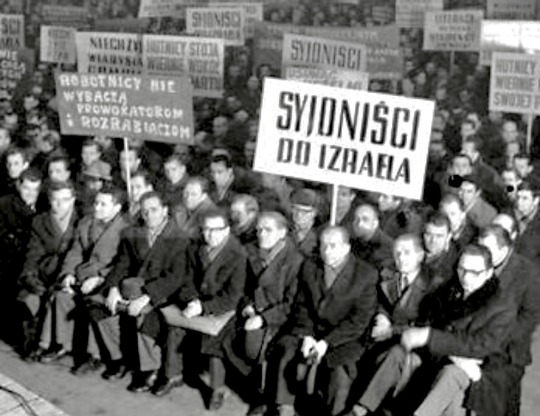
Polish people made themselves the cities of their minority Jewish population and told Jews to go back to Eretz Y'Israel. At least they knew where the Jews were indigenous to.
Since England controlled and blocked immigration of Jews to Palestine, the Jews were literally sitting ducks.
The Poles then abetted the Nazis in murdering 2.25 million of the 2.5 million Polish-Jewish population.
#israel#secular-jew#jewish#judaism#israeli#jerusalem#diaspora#secular jew#secularjew#islam#Poland#polish antisemitism#Poland ethnic cleansing#antisemtism#European antisemitism#European ethnic cleansing#indigenous
149 notes
·
View notes
Note
Hey man. Sorry about this, but I am arguing with one of my friends about Israel. I know you had some good posts on the arguments about the sterilization of the Beta Israel and the Nakba, but I'm struggling to find them. (I am looking for other sources, but your stuff was striking the first time I read it.) Do you know what you tagged those with? Alternatively, what sources do you recommend? Thank you!
Here are some posts I'm rather proud of, and hope you will find helpful. Tags are below.
There were no sterilizations.
What caused the Nakba?
Why the abandonment of the Jews made Zionism necessary.
There was no "peaceful coexistence before 1948".
Ottoman Muslim settler-colonialism in 1800s Palestine.
"Israeli apartheid" is a bad-faith lie.
"Palestine is a climate / environment issue" is an even bigger lie.
Was Nazism wrong, or just wrong when white people did it?
Killing Jews is not - and can never be - "liberation"
How often did the media lie about conditions in Gaza?
BDS is the abstinence-only sex education of the Left
Palestine is the Confederate Lost Cause of the Left
#beta israel#ethiopian jews#depo-provera#gaza#apartheid#zionism#arab antisemitism#muslim antisemitism#amnesty international#human rights watch#united nations#european antisemitism#leftist antisemitism#jumblr#israeli wildlife#wildlife of israel
272 notes
·
View notes
Text
i think some of u ppl r just incredibly cruel and callous n use leftism n the guise of progressiveness to seek to enact that cruelness n bloodlust inside u on ppl that r in ur eyes now deemed 'acceptable' to enact any and all forms of violence against. there is truly no saving some of youse
88 notes
·
View notes
Text

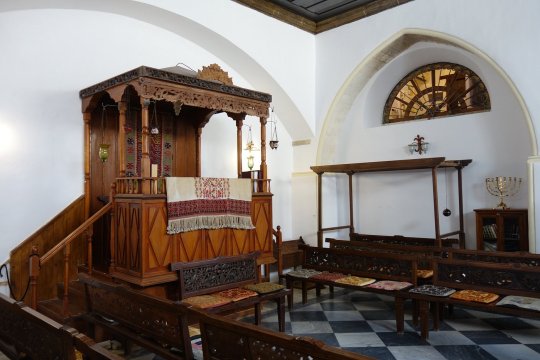

etz hayyim (“tree of life”) synagogue in chania, crete, greece. the building dates to the 14th-15th centuries, and was originally a venetian catholic church. it was acquired by chania's jewish community and converted into a synagogue in the late 17th century. chania's jews were deported due to the holocaust in 1944, after which the building remained abandoned until restoration in the 1990s.
romaniote jews are the oldest jewish community in europe and one of the oldest in the world, thought to have lived in and around present day greece since before 70 ce. they have their own liturgy that is unrelated to the more commonly used european ones (ashkenazic and sephardic).
#greece#architecture#interior#worship#jewish#romaniote#old & new#my posts#for all u Westerners 'rom' = constantinople referring to itself as the roman empire#so rome/italy is like 'west roman' constantinople/greece/anatolia is like 'east roman'#in the west its called 'byzantine' from 'byzantium' (proto-constantinople)#also it insinuates w roman empire was the 'real' roman empire (despite east lasting 1000 years longer)#in most mediterranean & w asian languages greece/greek is 'yunan/yawan/yavan' (from ionians) or 'rum/rom' (from roman)#in actual greek it's 'hellas'/'ellas' (from hellenic)#in georgian it's 'saberdzneti' for some reason but they also have their own names for a bunch of places#'greece' comes from the latin name 'graecia'#in a lot of slavic languages it's some variation of 'greece'. weird considering most were never/hardly under latin influence#if you think this is a lot just wait until u hear about the all the names for armenia#but yeah these guys were also in a lot of the balkans. if you're from the balkans and jewish you MAY have romaniote ancestry#(at least more recent romaniote ancestry than all other european jews)#not a guarantee though especially if you're ashkenazi#theres like. other jewish groups in europe that predated ashkenazi migration#most of them just got absorbed into the ashkenazi population
226 notes
·
View notes
Text
i admit that i find it a little bit frustrating how Wildly Astonished other antizionist jews act when i tell them my israeli jewish family have lived in the region since [some unknown length of time before 1800 when there start being records about it]
#and then they're like ''ohhh they're mizrahi!'' [connotation nonwhite‚ virtuously indigenous]#and i have to be like. no. it's just that‚ as palestine was in fact ottoman-administered greater syria for most of the last 600 years‚#you could get there from other parts of the ottoman empire. such as the part of now-ukraine your ashkenazi family is also from.#it wasn't actually a hermetically sealed arab-only ethnostate that evaporated immigrants on sight. it was a pretty decent place to live as#a jew by at least some accounts. or better than the front of the hapsburg-ottoman war anyway which is where they were coming from.#i'm not sure who you think it's serving exactly to believe that there were literally no ashkenazim in the middle east before the 1st aliyah#however there were some. and this information does not actually threaten a modern anti-state of israel position like at all.#but since apparently you've constructed your new Diaspora-Centric Identity around the idea that 'palestine' and 'diaspora'#are the two mutually exclusive nonoverlapping regions and the former is ontologically a no-european-jews-allowed zone#i guess i can give you a minute to try to figure it out.#ugh sorry this is nothing it isn't anything. for one thing it's fantastically unimportant#and for another thing i don't know how to like talk about it in a way that doesn't make me sound at least kind of like im trying to justify#myself as being somehow less complicit or something. i mean i think my complicity as an american dwarfs the rest of it honestly but.#i just feel really insanely alienated where the rhetoric of my theoretically most closely politically aligned group is not really built to#like. accommodate the facts of my family history.#sorry. i have honestly no idea why im so obsessed with articulating this concept ive just been chewing on it pointlessly for days#box opener
58 notes
·
View notes
Note
hello! i hope it's alright to ask you this but i was wondering if you have any recommendations for books to read or media in general about the history of judaism and jewish communities in egypt, particularly in ottoman and modern egypt?
have a nice day!
it's fine to ask me this! Unfortunately I have to preface this with a disclaimer that a lot of books on Egyptian Jewish history have a Zionist bias. There are antizionist Egyptian Jews, and at the very least ones who have enough national pride that AFAIK they do not publicly hold Zionist beliefs, like those who spoke in the documentary the Jews of Egypt (avaliable on YouTube for free with English subtitles). Others have an anti Egyptian bias- there is a geopolitical tension with Egypt from Antiquity that unfortunately some Jewish people have carried through history even when it was completely irrelevant, so in trying to research interactions between "ancient" Egyptian Jews and Native Egyptians (from the Ptolemaic era into the proto-Coptic and fully Coptic eras) I've unfortunately come across stuff that for me, as an Egyptian, reads like anti miscegenationist ideology, and it is difficult to tell whether this is a view of history being pushed on the past or not. The phrase "Erev Rav" (meaning mixed multitude), which in part refers to Egyptians who left Egypt with Moses and converted to Judaism, is even used as an insult by some.
Since I mentioned that documentary, I'll start by going over more modern sources. Mapping Jewish San Francisco has a playlist of videos of interviews with Egyptian Jews, including both Karaites and Rabbinic Jews iirc (I reblogged some of these awhile ago in my "actually Egyptian tag" tag). This book, the Dispersion of Egyptian Jewry, is avaliable for free online, it promises to be a more indepth look at Egyptian Jews in the lead up to modern explusion. I have only read a few sections of it, so I cannot give a full judgment on it. There's this video I watched about preserving Karaite historical sites in Egypt that I remember being interesting. "On the Mediterranian and the Nile edited by Harvey E. Goldman and Matthis Lehmann" is a collection of memiors iirc, as is "the Man in the Sharkskin Suit" (which I've started but not completed), both moreso from a Rabbinic perspective. Karaites also have a few websites discussing themselves in their terms, such as this one.
For the pre-modern but post-Islamic era, the Cairo Geniza is a great resource but in my opinion as a hobby researcher, hard to navigate. It is a large cache of documents from a Cairo synagogue mostly from around the Fatimid era. A significant portion of it is digitized and they occasionally crowd source translation help on their Twitter, and a lot of books and papers use it as a primary source. "The Jews in Medieval Egypt, edited by: Miriam Frenkel" is one in my to read pile. "Benjamin H. Hary - Multiglossia in Judeio-Arabic. With an Edition, Translation, and Grammatical Study of the Cairene Purim Scroll" is a paper I've read discussing the Jewish record of the events commemorated by the Cairo Purim, I got it off either Anna's Archive or libgen. "Mamluks of Jewish Origin in the Mamluk Sultanate by Koby Yosef" is a paper in my to read pile. "Jewish pietism of the Sufi type A particular trend of mysticisme in Medieval Egypt by Mireille Loubet" and "Paul B Fenton- Judaism and Sufism" both discuss the medieval Egyptian Jewish pietist movement.
For "ancient" Egyptian Jews, I find the first chapter of "The Story of the Jews: Finding the Words 1000 BC-1492 AD” by Simon Schama, which covers Elephantine, very interesting (it also flies in the face of claims that Jews did not marry Native Egyptians, though it is from centuries before the era researchers often cover). If you'd like to read don't click this link to a Google doc, that would be VERY naughty. There's very little on the Therapeutae, but for the paper theorizing they may have been influenced by Buddhism (possibly making them an example of Judeo-Buddhist syncretism) look here (their Wikipedia page also has some sources that could be interesting but are not specifically about them). "Taylor, Joan E. - Jewish women philosophers of first-century Alexandria: Philo’s Therapeutae reconsidered" is also a to read.
I haven't found much on the temple of Onias/Tell el Yahudia/Leontopolis in depth, but I have the paper "Meron M. Piotrkowski - Priests in Exile: The History of the Temple of Onias and Its Community in the Hellenistic Period" in my to be read pile (which I got off Anna's Archive). I also have some supplemental info from a lecture I attended that I'm willing to privately share.
I also have a document compiling links about the Exodus of Jews from Egypt in the modern era, but I'm cautious about sharing it now because I made it in high school and I've realized it needs better fact checking, because it had some misinfo in it from Zionist publications (specifically about the names of Nazis who fled to Egypt- that did happen, but a bunch of names I saw reported had no evidence of that being the case, and one name was the name of a murdered resistance fighter???)
#cipher talk#I find Leontopolis fascinating because after the first time a bunch of Egyptian Jews built a temple in Egypt a second guy did it#And allegedly had a not terrible scriptural justification! And the temple lasted for THREE EXTRA YEARS after Jerusalem was sacked!#Never let anyone tell you there was only one temple#There's also other stuff but this is what I immediately had#Some books I have I'm pretty sure just aren't good to start with lmao they're about very specific stuff#Modern Middle Eastern Jewish Thought: Writings on Identity politics and culture is interesting and includes Egyptian Jews#But it's definitely got a zionist bias. It's mostly essays#I'd definitely recommend reading up on Joseph Cattaui and Murād Farag because they were simply so influential#Even though Farag was a dumbass that wrote the first Arabic defense of Zionism#Ya‘qub Sannu‘ is also fascinating- he spent a lot of his time defending Muslims to European audiences so some people assumed he reverted#He didn't he just took a hard stance on it. Also he got exiled for criticizing the Khedivate#All 3 are in MMEJT iirc
104 notes
·
View notes
Text
people who use DNA tests to """prove""" Jews aren't indigenous to Israel by showing some Israelis ancestry is purely European.
you know Jewish converts are a thing right?
#israel#jumblr#jewish convert#jewish conversion#in this house we love and support jewish converts#and we don't use their ancestry as a way to disprove history#the facts are Israel was historically a Jewish land#and many modern jews (specifically Mizrahi) DO have ancestral links to Israel#so using DNA of European Jewish converts for your narrative is just fucked up#Jewish converts may not have a “birthright to the land” but they do have a right to immigrate gain a citizenship and live here#am yisrael chai
64 notes
·
View notes
Text
I did not just see a self-hating jew call zionism "manifest destiny" i did nooooooot

someone made a cutesy photo that literally called for the death of israel, like verbatim, it said "I need the death of israel" and this was someone's response (right after saying, "yikes that is my peoples' homeland.") please, diaspora jews, grow a spine and attach it to your brain stem. in what fucking world are jews living in our literal ancestral homeland in any way equatable to manifest destiny? fuck you, spineless schande
#i am so done with diaspora jews folding over like wet paper towels every time a genocidal goy posts ''death to israel''#israelis and zionists are not equatable to european mormons. how the fuck do you not see that you're drinking antisemitic rhetoric?!#fuck OFF comparing us to mormons. omg. brain worms#lucky.txt#antisemitism#social
169 notes
·
View notes
Text




something something you won't avoid being sent to the death camp just because you coddle your oppressors instead of siding with other oppressed people something something you're not and never will be the exception something something first they came for the communists something something history repeats itself
#m#politics#lgbtq#queer politics#antisemitism#history#also “he considered eastern european jews to be racially inferior” yikes
111 notes
·
View notes
Text
Zionists pull the “Uhm ackshally it was always called Judea” card all the damn time. That was the ROMANS that colonized Judea… can we all just pick up a history book and read?
Now. Tell me why do Palestinians have to pay for Europe’s crimes? Byzantines, Romans, the Holocaust, Christian Europe targeting Jews since the 9th century. Yet the Zionists push a narrative that it’s the Arab Muslims that owe us all of their land and belongings. Certainly couldn’t be a hidden, sepratist, white supremacist ideology laced with CIA interest in Oil acquisition…
#zionism#history#romans#byzantine empire#roman empire#european history#jumblr#palestine#anti imperialism#anti capitalism#jews for palestine
191 notes
·
View notes